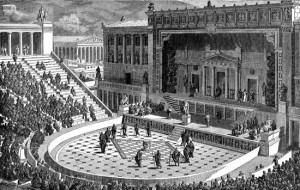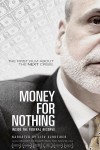submitted by jwithrow.
Author: joegalt
Why We Don’t Yet Live in the “World of Tomorrow”
By Paul Rosenberg, Freemansperspective.com

The following is a quote from a digital currency mailing list, posted at some time in the late 90s or early 2000s:
Consider that up to say 1970, people invented and developed Major Shit left, right and center. Jets, spacecraft, fiber, chips, laser… plastic… satellites… it goes on and on.
In contrast, the world’s done Absolutely Nothing for a good 20 years – at best, refinement. (“TV now has OVER 100 channels! and MORE PIXELS.”)
Indeed we presently live in a time of sort of… fantasy inventions. “Nanotech!” “Robots!” etc — all fantastic on paper, but totally nonexistent.
However flamboyant, this statement is true. Since 1970, there have been very few primary inventions. What we do have are mere improvements.
The Laws of Physics Are Old
Physics has gone almost nowhere since the 1960s. Here’s a short list of developments in physics:
Gravity: The laws were defined by Galileo and Newton in the 17thcentury.
Planetary motion: Defined by Kepler in 1609 and 1619.
Mechanics: The base laws were defined by Newton in the 17th century. Other specific laws were understood as far back as ancient times.
Gasses: Boyle defined his law of gasses in 1662.
Hydraulics: The laws and uses were developed between the 17th and 19th centuries.
Electromagnetism: James Clerk Maxwell defined these laws in 1865.
Relativity: Galileo defined the first laws of relativity in the 17th century; then Einstein defined new ones in 1905 and 1915.
Quantum mechanics: Einstein expanded upon the work of Max Planck and defined the quantum effect in 1905.
Atomic theory: The modern model of the atom was clarified by Neils Bohr in 1913.
Superconductors: Superconductivity was discovered by Heike Kamerlingh Onnes in 1911 and clarified by Fritz and Heinz London in 1935.
Quantum electrodynamics: Defined by Feynman, Tomonaga, and Schwinger in about 1962.
And what has physics done since then? Not a lot. Most visibly, physicists argue about theories that require twenty six dimensions and smash subatomic particles together.
In other words, physics has turned into a major yawn. Even the few exciting developments we have seen, such as cold fusion and high temperature superconductors, have gone nowhere. And exciting inventions like 3D printing, public cryptography, and cryptocurrencies have not only come from outsiders, but have been attacked by institutions.
Consider the major inventions that erupted between 1870 and 1970: railroads, telegraph, telephones, electricity, radio, TV, airplanes, cars, rockets, spacecraft, plastics, fiber optics, etc., etc., etc.
In the forty three years since – nearly half that time-span – what did we get?
That’s right: louder speakers, more pixels, and smaller screens.
So… either science has been hobbled or we’ve already discovered almost everything.
The Prison of Science
Since I don’t for a moment believe that we’ve discovered all that can be known, the obvious conclusion is that physics is being held in a sort of stasis.
My argument has been this:
Institutions are oppositional to individual will, and individual will is the only thing that creates breakthroughs in science.
Albert Einstein agrees with me, by the way. See this:
Everything that is really great and inspiring is created by the individual who can labor in freedom.
And this:
It is a miracle that curiosity survives formal education.
And this:
Great spirits have always been violently oppressed by mediocre minds.
Within an institution, a scientist must either please the authorities or see his work jettisoned. And scientific grants always have to please authorities.
So, who are these “authorities”? They would certainly include government bureaucrats, but the authorities that really matter here are older scientists who have given themselves over to institutional politics. These are the more common oppressors of new and different ideas.
There’s an old joke that reflects this:
Q: How does physics progress?
A: One funeral at a time.
The oppressors of new scientific theories are entrenched in scientific institutions. From there, they either allow or disallow almost every research project. And anyone who is not part of those institutions is ridiculed, excluded, and ignored.
It was farm boys, outsiders, and self-educated people who invented radio, television, the airplane, the electric light, the telegraph, the phonograph, the automobile, radar, and much more.
The creations of institutional science have been considerably less impressive. And those advances generally required the inventors to suffer along the way. Young Albert Einstein, after all, was rejected by all the institutions of his time. He made his great discoveries while working as a mere patent clerk.
God only knows how many wonderful things have been lost to institutional politics.
All of this is not because of “certain bad people” – institutional power turns good people into bad people. (Ask a grad student.)
Is There an Answer?
Sure there is! The same thing that worked in the 19th century: the separation of science and institution.
If you believe the line coming from today’s universities, you’d think that nothing scientific could exist without them. But to believe that, you’ll have to pretend that the previous, non-institutional era never happened.
But it did happen, and the pre-institution era of science produced far more basic discoveries than the institutional era.
We may have been indoctrinated by these institutions, but that has nothing to do with truth.
Paul Rosenberg
[Editor’s Note: Paul Rosenberg is the outside-the-Matrix author of FreemansPerspective.com, a site dedicated to economic freedom, personal independence and privacy. He is also the author of The Great Calendar, a report that breaks down our complex world into an easy-to-understand model. Click here to get your free copy.]
The Power in Paradoxical Wisdom
submitted by jwithrow.
There is a certain power that one stumbles upon once they accept the “paradoxical wisdom” concept.
This power is not physical in nature. It is not like money power or political power which must be grabbed by men (or women) of ambition. It is a power only found when one is not seeking it; it is not something to be sought after and possessed. For this reason it is a power that is not corrupting and it is not fleeting. The power inherent in paradoxical wisdom is one of peace and serenity.
It is the understanding that there is something greater and more important than money, status, or worldly power. It is the understanding that each one of us are so much more than what we appear to be on the surface and that each one of us is here in this moment for a very specific reason; we are not irresponsible little people that are here by chance.
There is an inner calmness that develops once one comes to the realization that he (or she) does not know. The trivial occurrences of the day become completely irrelevant.
Those who have not yet found this power worry and fret over small mishaps or social popularity or what have you. But those who have found the inner peace care little for any of these things.
This is why those who possess calmness of mind and spirit cannot be gossiped about or ridiculed. They are not very interested in playing the worldly game of ego, power, or status and so insults do not bother them in the slightest. This makes it very unsatisfying and a bit embarrassing for the one doing the insulting; insulting another without receiving a reaction is like playing a game of catch with one’s self.
The power contained within paradoxical wisdom allows one to maximize his (or her) productive energy. He no longer wastes energy worrying about trivial events. He no longer wastes energy worrying about physical appearance or fashion. He no longer wastes energy worrying about how he is perceived by others. He no longer wastes energy playing the power game.
As it turns out, we tend to waste quite a bit of energy just in perceived self-defense or in attempts to justify our thoughts and actions to others. This wasted energy can be applied in a much more positive and creative way once the need for self-defense and justification fades away.
The power found within the paradoxical wisdom concept stems from acceptance.
Once one understands that he does not have all of the answers then it becomes acceptable for him (or her) to be fallible and make mistakes. And it becomes acceptable for him to stray from the popular path in search of knowledge and wisdom. And perhaps most importantly, he no longer needs to justify his thoughts or actions to others and he no longer feels as though others should justify their own thoughts or actions to him.
He is free.
Paradoxical Wisdom
submitted by jwithrow.
Let’s go back to ancient Athens.
Somewhere around 400 B.C., a man named Chaerephon asked the Oracle of Delphi if there was anyone alive wiser than Socrates.
The Oracle responded that there was no one wiser.
When he learned of this, Socrates suggested that his must be a paradoxical wisdom because he knew very well that he possessed no wisdom at all.
Socrates set out to interview the other men in Athens who were considered wise – statesmen and poets mainly – and Socrates found that each man did indeed consider himself to be quite wise. But Socrates did not find them to be wise at all.
Socrates determined that the Oracle was correct. He was indeed the wisest man in the land – but only because he was aware of the fact that he possessed no wisdom at all.
Socrates was quoted as saying “All I know is that I know nothing”.
It was this paradoxical wisdom that enabled Socrates to both learn with an open mind and to develop the Socratic Method of problem solving based on logic. Socrates was able to admit that he lacked wisdom and because of this he dedicated his life to the pursuit of knowledge and wisdom. In this pursuit of knowledge and wisdom, Socrates discovered a profoundly higher purpose.
This was demonstrated in Plato’s account of Socrates’ self-defense at his public trial in 399 B.C. The charges brought against Socrates were corrupting the youth and impiety – the penalty for which was death. The trial took place in the People’s Court located in the agora (city square) of Athens. The jury consisted of 500 adult men, each 30 years old or older.
In his trial, Socrates demonstrated to the jurors that their moral values were misplaced because they were each primarily concerned with money, status, and politics whereas they should be primarily concerned with the welfare of their souls.
“Men of Athens, I honor and love you; but I shall obey God rather than you, and while I have life and strength I shall never cease from the practice and teaching of philosophy, exhorting any one whom I meet and saying to him after my manner: You, my friend, a citizen of the great and mighty and wise city of Athens, are you not ashamed of heaping up the greatest amount of money and honor and reputation, and caring so little about wisdom and truth and the greatest improvement of the soul, which you never regard or heed at all?”
We share this brief interpretation of Socrates’ philosophy because we think that there is tremendous value found in the paradoxical wisdom concept.
How often are we inclined to think that we have all the answers and that our way is the only correct way? How often do we tend to ridicule and look down upon others who do not share our way of thinking? How often do we impede our own ability to learn with an open mind because of our tendency to believe in our own wisdom?
Paradoxical wisdom is the key to humility. Those who think that their way is the only way tend to be arrogant and rude towards others. They simply do not know that they do not know.
We suspect that this is what Christ meant when he said, according to Matthew, “Amen I say to you, unless you be converted, and become as little children, you shall not enter into the kingdom of heaven”.
And we suspect that in just the same way this is what is meant in Hinduism, as translated from the Upanishads: “The Brahman is unknown to those who know it and known to those who know it not”.
Money for Nothing Trailer
submitted by jwithrow.
The Middle-Class is Fading
submitted by jwithrow.
The middle-class is fading. Fast.
The jobs that have been lost since the financial system teetered on implosion in 2008 have not come back. Those jobs are not coming back. More education won’t bring them back. More laws won’t bring them back.
The government’s job report says that more and more jobs are being created, but guess what? They are mostly low paid part-time or temporary jobs; they are not the middle management jobs in the high rise buildings.
As for why the middle-class is being wiped out, it’s no mystery. This very same scenario has occurred all throughout history. One can look back as far as the time of the Roman Empire and see that there is nothing new under the sun. History rhymes and those ignorant of history are doomed to repeat its mistakes.
You see, every time the currency of the land has been inflated and debased, the middle-class has been destroyed. Inflation transfers value from those who must work to earn currency to those who control the currency supply.
They don’t tell you this in school. They don’t tell you this in college. They don’t even tell you this if you major in finance or economics. They probably don’t know themselves. So most people never understand what is happening. Their paycheck gets bigger and bigger so they can’t figure out why they can never get ahead. They don’t realize that their bigger paycheck is buying less and less. They don’t understand the difference between nominal income and real income.
In Roman times it was the government that controlled the currency supply. The Romans would collect taxes and tributes from citizens and conquered peoples and they would then melt the precious metal coins and add in cheaper metals such as copper to re-mint more coins of lower value. They would then pay the Roman army with these cheaper coins and pretend that they had the same value as before. The general market caught on to this process and began to charge higher prices for food and goods in response. The middle-class was destroyed over time and eventually the economy collapsed. Then the Empire fell.
In modern times it is the Federal Reserve and the other central banks of the world that control the currency supply. They do this by simply creating currency units from nothing and using the new currency as they see fit. They inject some of this new currency into the banking system, they use some of the new currency to buy government debt, and they inject some of the new currency into the IMF and foreign central banks. This directly leads to more and more debt and an increase in consumer prices across the board.
They are printing currency at will so why is the middle-class working so hard for 2% annual raises?
The rules of the game have changed and those unable to recognize this and adjust accordingly will be wiped out with the middle-class – just as has happened throughout history.
The Earth Belongs to the Living, Not the Dead
By: Paul Rosenberg, Freemansperspective.com

What if your grandfather had gone on a wild spending binge, long before you were born, and put himself millions of dollars in debt to people who knew he could never pay? Would it be your obligation to work double-shifts all your life to pay that debt back? And if you died before paying it off, would it become your baby’s obligation?
I think most of us would answer those questions with a resounding “No way!” As well we should. We are not and should not be slaves to the past – slaves to actions we never took and for which we had no possible means of consent.
On September 6th, 1789, in the very first year of the US Constitution, Thomas Jefferson endorsed precisely this conclusion in a letter he wrote to James Madison:
I say, the earth belongs to each of these generations during its course, fully and in its own right. The second generation receives it clear of the debts and encumbrances of the first, the third of the second, and so on.
For if the first could charge it with a debt, then the earth would belong to the dead and not to the living generation.
He wrote the same thing to John Wayles Eppes twenty-four years later, in June of 1813:
The earth belongs to the living, not to the dead.
To lay debt upon the unborn is thoroughly immoral. To try to enforce such a debt is thoroughly criminal.
Your Child or Grandchild
This conversation is critically important, because each child born in the US is born massively indebted. Using $200 trillion to represent the promises already made to people now living (some estimates are higher) and assuming a population of 310 million, that comes to $645,161 of debt, by the time your child reaches his cradle. If you expect your child to become a productive person, his or her share will be roughly twice that amount, or approximately $1.3 million.
(The US government is not unique in this regard, by the way. I use the US example, because it’s easier and because most of my readers seem to be Americans.)
Would you sign papers loading your baby with such a debt?
I am stating these facts in personal terms to cut through the usual BS that passes for public discourse. I am also using the voices of “founding fathers,” partly because it undercuts the fraudulent government story that “we’re following the wisdom of the founders.” Beside, we’re talking about real persons here. Making it personal is not manipulative, but accurate. To make it amorphous would be manipulative.
And while I’m on the subject of founding fathers, here’s something George Washington wrote in a letter to James Madison, also in 1789:
No generation has a right to contract debts greater than can be paid off during the course of its own existence.
I think that’s a very clear and very moral expression. It is not, however, what has been done.
A group formed recently under the phrase, “Not our debt.” I know nothing about the group, but their phrase is entirely correct. The debt of the US government does not belong to us, and we have no moral obligation to repay it.
Most of us do pay something toward that debt (which grows exponentially, just the same), but we should stay very clear as to why we pay. That reason, of course, is naked force, as in coercion and violence. There is no morality to it, except the morality that some people might invent, either to salve their consciences or as sycophants to power. (Though most just do what everyone else does, never considering why.)
My advice is this: Do whatever you want as far as paying under threat, but don’t ever be confused about the morality of this situation. This is a swindle of gargantuan proportions. And that’s precisely what Thomas Jefferson believed. You can see this in a letter he wrote to John Taylor, dated May 28, 1816:
The principle of spending money to be paid by posterity, under the name of funding, is but swindling posterity on a large scale.
Do what you need to do, but don’t ever think you have a moral responsibility to pay that kind of debt.
Paul Rosenberg
[Editor’s Note: Paul Rosenberg is the outside-the-Matrix author of FreemansPerspective.com, a site dedicated to economic freedom, personal independence and privacy. He is also the author of The Great Calendar, a report that breaks down our complex world into an easy-to-understand model. Click here to get your free copy.]
How Do You Define Yourself?
submitted by jwithrow.
Making the Income Tax Fair
submitted by jwithrow.
Well tax season is here once again and we have been hearing a lot about the need to make the income tax system more fair and equitable.
We couldn’t help but overhear a woman’s conversation the other day on the subject matter:
“Did you know that Mr. So-and-so’s tax refund was ten thousand dollars!? He doesn’t claim much of his business income but he claims all of his children, can you believe that!? It’s just not fair – that’s exactly what’s wrong with America!”
And that got us to thinking – maybe she is right.
Maybe we do need a more fair income tax.
After all, some people only pay 15% but some people pay 25% and even others pay 35%! And some corporations don’t even pay 10%!
You know what, we agree with our angry woman. We do need to have a more fair income tax!
We think the tax system should be structured based on our American heritage. Our income tax should foster liberty and justice for all. This is the land of the free, is it not?
Our income tax should make sure that every single American shoulders an equal burden, especially the rich! And our income tax should make sure that corporations pay the same amount as people!
Yes, dear friend, having thought it over more we are one hundred percent on board with a fair income tax.
Now we are not sure what our inspirational angry woman had in mind to make taxes more equitable, but we have thought of a pretty good solution.
Get rid of the income tax completely. Make it 0%.
Now it’s fair!
And now it’s modeled after our American founding principles. How can a man be free if he is not allowed to keep the fruits of his labor?
What’s that you say? How will we pay for all of our government operations?
Easy – we won’t. And we shouldn’t.
Oh, and it’s not ‘our’ government. If it were ours then we would be the boss. Instead, the government tags and monitors all of us at all times.
Mr. So-and-so has the right idea.
The Secret Appeal of Politics
By Paul Rosenberg, Freemansperspective.com
The Internet is full of stories about politicians acting badly and doing the opposite of what they promised. Talk radio is full of the same things, all day, every day. Even around office water coolers, almost everyone will admit that politicians are liars and thieves.
Given all of this, it’s rather bizarre that people still believe and obey the bums. If we knew such things about a neighbor, would we continue to take them seriously?
Yet, for some reason, politicians get a permanent pass on anything stupid they do.
The first reason for this is simply that most people have been bamboozled. They were taught that government is necessary and that without it, we’d all be ignorant savages, eating whatever few berries and roots we could scrounge… that without government nothing would be built, nothing invented, and nothing taught.
That’s all propaganda, of course, paid for by the people it praises. But, it’s what we were all taught and it’s hard for people to let it go, no matter how stupid it is.
The second reason is that people are afraid. We all know why.
None of that, however, is what I want to cover today. Instead, I want to look at the subtle reasons why people can’t let go of “politics.” These reasons are very powerful, but they lie beneath the surface and are harder to identify than self-serving, government-funded BS.
Reason #1: I Can Blame Anyone but Me
Somehow, people all across the West have become pathologically afraid of blame. It probably began as a corrosive fear of hell: If I’m to blame for anything, I’ll go to hell, and that must be avoided.
But be that as it may, this fear of blame allows political parties to provide a highly desirable service: They help you assign all blame to others. If you like the Red party, you can always affix blame to the Blues and not to yourself. If you’re in the Blue party, you can lay all blame onto the Reds.
It’s actually an elegant scam. The Blue v. Red show lets everyone avoid taking any blame onto themselves, while the big machine keeps right on running.
This fear of blame is ridiculous, of course: We’ve all made mistakes. What matters is correcting them and not repeating them. But if we pretend we never make mistakes, nothing gets fixed and the problems continue.
This neurotic avoidance of blame puts politicians in wonderful position – they don’t actually have to solve anything, and any blame is deflected to their evil opposition.
Reason #2: It Makes Me Feel Brave at No Expense
Politics lets us pretend that we’re fixing problems at no expense, save talking. Actually doing something is not required. Politics empowers our mere words to generate powerful results.
At least that’s what people want to believe. It’s the easy way out. You never have to get up and act. You never have to take a real risk. No blood, no sweat, no tears.
This is just another scam, of course: The politicians continue do what they want, and the people keep right on believing, even though their words seldom generate any real results.
All they need to do is keep you in the game. So long as you keep hoping that your words will affect the future, they can do whatever they please.
The alternative would be taking responsibility onto yourself and acting on your own. Gain would require pain… precisely the thing that people want to avoid.
So, instead, they keep believing that politics will magically turn complaints into results, and they remain tied into the system, no matter how badly it fails them.
Reason #3: It Makes Me Feel Noble at No Expense
Politics lets you pour charity onto the targets of your choice, without any personal expense. The magical money pot in the capital city dispenses it, and you feel no pain.
It doesn’t matter what your target of choice is, by the way. For some, it’s “the less fortunate,” to others, it’s people on another continent. It really doesn’t matter, aside from the fact that it makes you feel good to help people and that you never have to put your hand into your own pocket.
Again, this is clearly a scam: The money comes from ourselves (in ways we don’t think about), from others (those super-rich people), or, primarily these days, from generations yet unborn in the form of state debt.
But, those are things that can be ignored, and politicians are always quick to help us ignore them.
Paul Rosenberg
[Editor’s Note: Paul Rosenberg is the outside-the-Matrix author of FreemansPerspective.com, a site dedicated to economic freedom, personal independence and privacy. He is also the author of The Great Calendar, a report that breaks down our complex world into an easy-to-understand model. Click here to get your free copy.]










